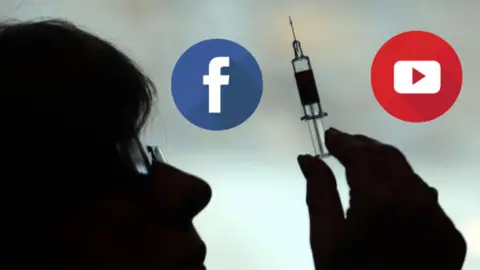YouTube, Facebook and Twitter align to fight Covid vaccine conspiracies
 PA Media
PA MediaThree of the largest social networks have said they will join forces with fact-checkers, governments and researchers to try to come up with a new way of tackling misinformation.
Vaccine misinformation has been rife on Facebook, Twitter and YouTube, with many questioning their efficacy.
At the same time, countries are preparing to roll out coronavirus vaccines in a bid to end the pandemic.
It is unclear how the initiative will improve the fight against fake news.
Fact-checking charity Full Fact will co-ordinate the collaboration.
Taking part in the effort alongside Facebook, Google-owned YouTube and Twitter are the UK's Department for Digital, Culture, Media and Sport; the Reuters Institute for the Study of Journalism; Africa Check; Canada's Privacy Council Office; and five other international fact-checking organisations.
With funding from Facebook, an initial framework will launch in January, setting out new standards for tackling misinformation, as well as a set of aims on the best way to respond to such information.


This latest initiative to try to agree a common approach to coronavirus and vaccine misinformation may not convince critics of the social media giants that they are doing enough.
By January when FullFact says an "initial framework" should have been agreed, countries should be starting to roll out vaccines to populations which have been subjected for months to a flood of scare stories about them. They will have seen stories ranging from suggestions that the vaccines have serious side-effects or haven't been properly tested to allegations that they are part of a plot involving Bill Gates to implant microchips in people and track them.
FullFact, which is one of the organisations providing fact checking for Facebook, says it has published 160 fact checks about the coronavirus and vaccines this year, with warning labels then being applied to many thousands of posts.
But the campaign group the Centre for Countering Digital Hate says 95% of such material on social media is not removed and reaches a vast audience.
The other challenge for this initiative will be getting social media giants with very different approaches to misinformation to agree a common set of rules. Meanwhile, politicians are getting impatient - in the UK the Labour Party has called for emergency legislation to stamp out anti-vaccine misinformation.

Full Fact said collaboration and ensuring that people had a good supply of reliable information would be core principles.
Will Moy, chief executive of Full Fact, added: "Bad information ruins lives, and we all have a responsibility to fight it where we see it. The coronavirus pandemic and the wave of false claims that followed demonstrated the need for a collective approach to this problem."
With a coronavirus vaccine potentially only months away, he said the concern was that "bad information could undermine trust in medicine when it matters most, and ultimately prolong this pandemic".
Facebook said it welcomed the effort "to discuss and develop new strategies" for tackling misinformation.
